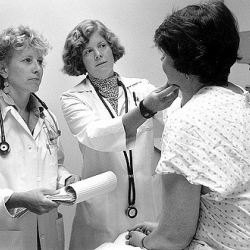There is little doubt that there is a war going on in the US - a war against doctors, a terrible development by any measure And there is plenty of evidence to back this up. Between more regulations, a poor public perception and now competition for our jobs, it seems what was once was a dream career has turned more into a nightmare.
I know this because I can clearly see what is happening to my profession. Our government is complicit in this war. This may sound like I’m a conspiracy theorist, but hear me out. One battle in the "doctor wars" is a recent evaluation report to Congress about the Centers for Medicare and Medicaid Services (CMS) Graduate Nurse Education Demonstration, which is an obvious attempt to replace doctors with nurse practitioners. This is a very bad idea.
This pilot program now in its sixth year is the nursing equivalent of medical school graduates’ residency training. Medicare is paying $200 million to bankroll this project on the premise that it is cheaper than paying for medical residents, without compromising care. Whereas Medicare compensates teaching facilities $150,000 per year for the training of a resident, it costs $30,000 to train an APRN. The degree of care provided by a doctor and an NP are not equivalent, but complementary. Let's look at a side-by-side comparison of the difference in training for an NP and a Family Practice Physician as an example:

Looking at the comparison makes it glaringly obvious that physicians and APRNs are not the same in terms of clinical expertise.
I don’t blame our government for seeking cost-efficient alternatives in the provision of healthcare. Where I do find the issue is cutting corners - saving money at the expense of patient safety is what concerns me. The Veteran’s Administration has approved APRNs to practice independently, without supervision by a licensed medical doctor. And organizations such as National Council of State Boards of Nursing (NCSBN) are fighting tooth and nail for greater autonomy. This is beyond troubling because the practice of medicine should not be left in the hands of someone with insufficient training. Coming into residency I realized that clinical medicine was a whole other ballgame than academic medicine and it was humbling to realize how much I did not know - and that's from someone with double the training of an APRN.
Of all specialties, primary care is the most important - in my humble opinion. That is because the primary care physician is the gatekeeper. The breadth of knowledge possessed by and required for the primary care physician to practice is encyclopedic. They are trained to recognize what they can treat and more importantly, what needs to be referred to a specialist. An APRN does not have the clinical expertise to do these independently.
Sure, money can be saved in the short-term, but have we considered long-term costs? The claim is made that health outcomes are no different from receiving treatment from a physician versus an NP, however, recent tragedies resulting in death and severe harm from care provided by NPs argues otherwise. Money can be saved, but again I ask at what cost? How comfortable would you feel placing your health in the hands of someone who has only a passable knowledge of medicine - and that person can practice independently without oversight. I find that very disconcerting. Nurse practitioners (NPs) are now able to practice independently in 24 states with “full practice” status.
Are physicians really paid all that much for the government to feel justified rolling the dice with your health? Physician compensation is mistakenly regarded as accounting for the bulk of healthcare costs when in fact nothing could be further from the truth. Even if doctors worked for free this would not be the answer to lowering the cost of healthcare in this country. Physician salaries account for only eight percent of overall healthcare expenditure in U.S. The notion that somehow it is cost-efficient to train and hire APRNs is completely misguided. We have bigger fish to fry if we want to address cutting down on healthcare costs. Tragically, this hasn't stopped some healthcare facilities from firing their physicians and replacing them with NPs or cutting residency spots and hiring NPs instead.
The cost of becoming a practicing doctor in this country is shockingly prohibitive. The average cost of medical school is upwards $300,000. The number of spots available for residencies is limited, meaning for those students that did not match into a residency will find themselves saddled with staggering debt and unable to pay it back. What is even sadder is that these students have no safety net - there are no paid clinical spots to maintain their medical knowledge and skills until they can re-apply for the match. What we really need to be doing is providing more funding to increase available spots for residencies and not leave those who have invested so much of their time, money and energy out in the dust.
The scope of clinical practice for APRNs is variable by state but it is becoming more frequent and more acceptable for them to perform invasive procedures such as colonoscopies. For a physician who endured three extra grueling years of fellowship training in gastroenterology to say this would be unfair is not doing it justice. But somehow greater autonomy and increases in scope of practice are continually awarded to APRNs - thanks to aggressive lobbying by well-funded and well-organized nursing organizations.
To say physicians are burnt out is an understatement and does not adequately capture what we feel. Physicians feel betrayed, belittled and underappreciated. What doctors give of themselves and the sacrifices they ask not just of themselves but of their families seems to be insignificant to policy-makers. Is the purpose of this article to lash out against APRNs? Absolutely not. Are we against practicing with APRNs? Absolutely not. But what we are for is patient-centered care. Doctors have the training to recognize what they don’t know, APRNs don’t. APRNs must recognize their limitations. It’s not an issue of ego - it’s an issue of not doing harm.
Yes, my friends, these are uncertain times in medicine. The white coat went from being a symbol of the noblest of achievements to completely meaningless; referring to the profession collectively as “providers” and not physicians; the Doctor of Nurse Practice taking assigned physicians only parking spots - these are all little pixels that are part of a larger picture. We must brace ourselves for an impending overhaul in the healthcare landscape. For any doctor reading this, if you thought you were irreplaceable - be warned - you are.


